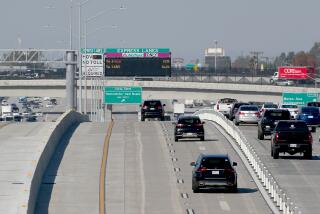Electric cars, plug-ins will help state meet low carbon fuel rule
Consumers have begun to buy fully electric cars and plug-in hybrids in numbers sufficient to help California meet its ambitious Low Carbon Fuel Standard, according to a new report.
California’s Low Carbon Fuel Standard, a regulatory program established under then Gov. Arnold Schwarzenegger, requires a 10% reduction in the carbon intensity of transportation fuels used in the state by 2020.
Carbon intensity is a measure of how much carbon dioxide is spewed into the atmosphere from using a fuel. One of the ways to meet that goal is to reduce the use of gasoline and diesel.
PHOTOS: Ten cars with lowest sticker price per MPG
Some might argue that fuel-efficient vehicles such as the Toyota Prius technically accomplish the same thing by delivering more miles per gallon.
But the Prius, California’s bestselling car, doesn’t count toward the Low Carbon Fuel Standard, according to Eileen Tutt, executive director of the California Electric Transportation Coalition and Philip Sheehy, a technical specialist for consulting group ICF International.
Sheehy is also the author of the report that analyzed three ways that the Low Carbon Fuel Standard can be met.
Both said only fully electric cars and plug-in hybrids that draw power directly from the electrical grid count toward the goals.
But Tutt said the popularity of the Prius has helped in other ways.
“The success of the Prius helped to get consumers comfortable with the idea of electricity as a fuel,” Tutt said. “When plug in vehicles came out, be they plug-in hybrids or full battery electric vehicles, they weren’t a big leap in the minds of consumers.
“We have seen sales improve for plug–in vehicles at three times the rate that hybrids sold in their first three years. It’s still less than 1% of the market, but it is fast approaching 1%, faster than hybrids did.”
Sheehy said “we’re looking at a 5% to 10% contribution toward the LCFS from plug-ins and electric vehicles by 2020. That might not seem like much, but it would be significant and it will definitely increase over time.”
As of January, there were 31.9 million vehicles registered in California, according to the Department of Motor Vehicles.
More than 1.8% of those, or about 585,000, were hybrids or plug-in hybrids, the DMV said. Less than 04.% of those, or about 124,700, were pure electric vehicles.
ALSO:
Hands free may be safer, but it’s still not risk free
Chevy tries to spark Volt sales with up to $5,000 cash back
North American auto production will near 15 year high, but jobs won’t







